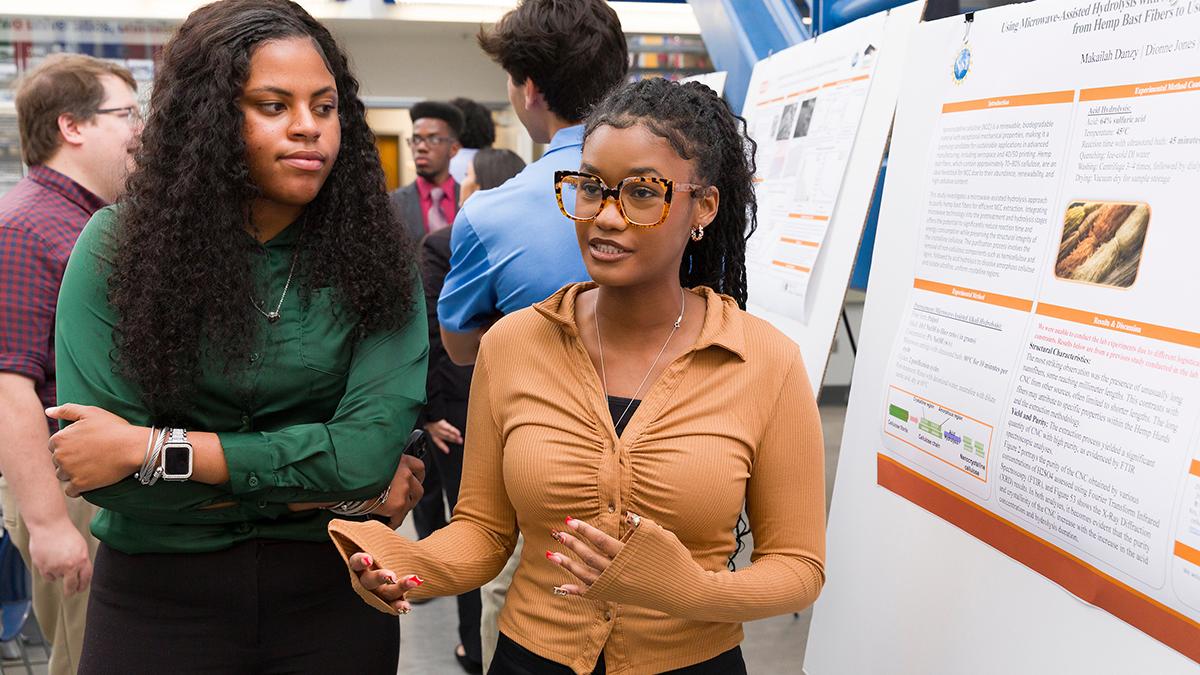
Photo by Scott Holstein/FAMU-FSU College of Engineering
Researchers at the FAMU-FSU College of Engineering are developing advanced polymers for next-generation materials that can be manufactured into new structures and devices
A research team from the FAMU-FSU College of Engineering has secured a $7.5 million grant from the National Science Foundation through Florida A&M University. The funding supports the Center of Research Excellence in Science and Technology (CREST) Phase II program, expanding on the successful Phase I CREST Center. The Center focuses on developing novel materials, characterizing their properties and manufacturing them into useful structures and devices.
Professor Subramanian Ramakrishnan from the joint college’s Department of Chemical and Biomedical Engineering leads this project. The research team includes professors Daniel Hallinan, Jr.; Rufina Alamo, Jamel Ali, Tarik Dickens, Jillian Pope, Komalavalli Thirunavukkurasu, Simon Foo, Raghav Gnanasambandam, and Moses Anubi, among other faculty experts.
Supporting FAMU’s R1 Research University Goals
'The CREST Phase II program integrates research with education, directly supporting FAMU’s goal of achieving R1 status as a research institution.
“I’m absolutely delighted to hear about Professor Ramakrishnan and his team winning this outstanding award,” said Suvranu De, the dean of the FAMU-FSU College of Engineering. “It’s a tremendous achievement and a massive win for FAMU and its growing national reputation for research excellence. This reinforces the university’s momentum toward R1 status.”

Educational and Training Components
Students in the CREST program will conduct research, collaborate with national laboratories and complete specialized coursework. Ramakrishnan emphasizes, “Our students will receive an exceptional, collaborative education that will empower them to work alongside some of the world’s leading scientists.”
The program aims to produce over 30 Ph.D. graduates from diverse backgrounds while engaging 50 undergraduates and reaching additional students through collaborative research. The initiative seeks to strengthen FAMU’s research capabilities and educational infrastructure, attract new faculty, and expand funding opportunities.
Research Focus Areas
The CREST Phase II program will advance the development of sustainable materials and manufacturing techniques.
“We are excited to explore bioderived sustainable thermoplastics, flexible hybrid recyclable electronics, and responsive sensors and actuators,” Ramakrishnan enthusiastically shared. “This initiative is pivotal for enhancing our research capabilities while preparing the next generation of engineers to tackle pressing national challenges.”
Research will focus on the self-assembly of complex building blocks, including polymers and proteins, to create hierarchical structures for various applications. The team will incorporate advanced discovery methods and machine learning techniques to improve custom materials design.
“These structures can help us easily adjust their properties, making it possible to create flexible printing methods for making devices,” Ramakrishnan explained. Researchers are developing polymer-based devices that can change their properties, including eco-friendly recyclable polymers and smart materials that respond to different conditions.
Interdisciplinary Research Team
The team includes experts from chemical, biomedical, electrical, industrial and manufacturing engineering, physics and biological sciences, working to create solutions that advance current capabilities.
Professor Rufina Alamo, who specializes in crystalline polymers, collaborates with Professors Ramakrishnan and Hallinan to develop bioderived recyclable polymers that could transform packaging practices. Hallinan will focus on polymer synthesis and energy storage. Professor Tarik Dickens applies AI and machine learning techniques to optimize the additive manufacturing of polymer electronic devices. Associate Professor Jamel Ali explores bioprinting of biohybrid soft materials and micro-robotics.
Industry and National Laboratory Partnerships
The CREST team collaborates with industry leaders and national laboratories, including ExxonMobil, DOW, the National Renewable Energy Laboratory (NREL), and others. The team works closely with nScrypt, a 3D printer manufacturer focused on defense and NASA applications, using their technology to manufacture devices and structures.
Faculty collaborate with scientists at Sandia, Brookhaven, and Oak Ridge National Laboratories to develop advanced characterization and manufacturing techniques. At the University of Delaware, they partner with Professor Thomas Epps, a recognized expert in polymers and composites who specializes in functional materials such as battery and fuel cell membranes and organic photovoltaics.
“The collaboration with Professor Epps is a key component of our research center’s efforts,” Ramakrishnan says. “These partnerships play a crucial role in the research we are able to do.”
Expected Outcomes and Applications
The CREST Phase II initiative aims to advance understanding of eco-friendly thermoplastics. Research findings will improve understanding of how materials’ structure, processing and function work together, making them applicable in various industrial processes. This framework will address research questions relevant to the Department of Defense, Department of Energy and National Institutes of Health while fostering industrial and academic collaborations to establish a sustainable research program at FAMU.

The program will train a new generation of engineering graduates with expertise to meet future workforce needs. Ramakrishnan added, “This award reflects the National Science Foundation’s commitment to funding high-quality research that showcases both intellectual merit and broader impacts—and benefits society.”
Editor’s Note: This article was edited with a custom prompt for Claude Sonnet 4, an AI assistant created by Anthropic. The AI optimized the article for SEO discoverability, improved clarity, structure and readability while preserving the original reporting and factual content. All information and viewpoints remain those of the author and publication. This article was edited and fact-checked by college staff before being published. This disclosure is part of our commitment to transparency in our editorial process. Last edited: 09/03/2025.
RELATED ARTICLES
Sandia National Laboratories: Advancing Innovation Through Strategic HBCU Collaboration
Researchers awarded $659,000 Department of Defense grant for materials study
